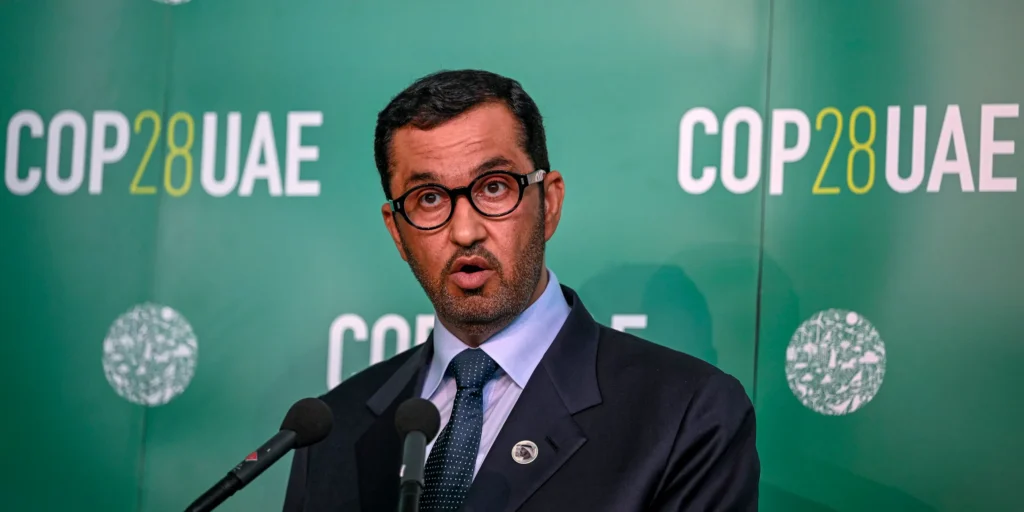On Thursday, world leaders will meet in the heart of an oil and gas-rich country, the United Arab Emirates, to negotiate a greener future and steps to combat climate change in a two-week-long marathon summit called COP28.
Two key facts have long loomed over the event – the globe is careening toward a climate disaster, and governments are failing to move quickly enough to combat its effects. Diplomats, heads of state, delegates, and many other groups and companies are set to gather in efforts to transition to greener energy use as fossil fuels continue to warm the planet dangerously.
Last year, at COP27 in Sharm el-Sheikh, Egypt, nations agreed to establish the Loss and Damage fund. This fund will aid poor, vulnerable countries in coping with climate change-fueled events exacerbated by greenhouse gas emissions primarily pumped into the atmosphere by wealthier nations. However, these emissions have largely continued unabated in the last decade.
At COP28, the United Arab Emirates is hosting the climate conference. However, as the fifth-largest oil producer and the COP president leading the twelfth-largest oil company globally (by production), many activists are angered. Ongoing wars in the Middle East and Ukraine have further complicated cooperation.

What is COP28?
COP stands for Conference of the Parties, with “parties” referring to the 197 nations that signed onto the United Nations Framework Convention on Climate Change (UNFCCC, or now UN Climate Change) in 1992.
Trinidad and Tobago signed and ratified the UNFCCC in 1994.
The confection addresses the “dangerous human interference with the climate system” and stabilises levels of greenhouse gas emissions in the atmosphere. Every year, the UN Climate Change convenes governments to jointly discuss how to address climate change.
This would be the 28th time countries have gathered under the convention, hence, COP28.
When is COP28?
The conference officially begins on November 30th and runs through December 12th, but historically, these negotiations have run past the official end as discussions become increasingly contentious. However, negotiators have already been meeting since last week in closed-door talks.
Where is COP28?
The high-level discussions are being held at Expo City, Dubai, an area described as a “future-centric mini-city,” connected to Dubai and Abu Dhabi via a rail transit system known as the Metro.
As with recent COPs, there are two zones for the event: the Blue Zone, where official negotiations occur and where world leaders speak, and the Green Zone. The Green Zone is more widely accessible with side events organised by youth, civil society, academics, businesses, and others.
What is the goal of COP28?
Every country, every organisation, and nearly every group attending COP28 will have slightly different answers.
This year, the results of the first formal assessment of whether nations are on track to meet their goal following the 2015 Paris Agreement – to limit warming below 1.5 degrees Celsius above pre-industrial levels.
Beyond 1.5 degrees Celsius, scientists have agreed that it will be increasingly difficult for countries to cope with severe weather, drought, heat, and rising sea levels.
If done correctly, according to the United States Special Presidential Envoy for Climate, the Global Stocktake would look at the world’s progress toward the agreement, the gaps that exist today, and a way forward.
Another primary goal will be operationalising the Loss and Damage fund, a significant win at COP27 for small island developing states. Over the last year, committees met to answer questions about who will pay into the fund, who will manage the money, and who can receive it. However, all countries have to come to an agreement this year.
Finally, another report, dubbed the Adaptation Report, is expected to be released. It will demand greater spending and focus on adapting certain areas of the globe to a warmer reality, which will also look at reducing emissions. At the end of the summit, a political agreement could emerge where nations commit to replace fossil fuels with cleaner energy sources. However, in the past, these fossil fuel “phase out” statements have come with caveats attached, even if nations agree to the premise.

Who will be at COP28?
Current estimates suggest over 36,000 delegates, including world leaders, negotiators, observers, and media, are expected to attend, according to the UN Climate Change. The Emirates COP Presidency has said they expect nearly 70,000 people to attend.
Key world leaders, such as United States President Joe Biden and Chinese President Xi Jinping, will not be in attendance. On Tuesday evening, after expressing his desire to attend, Pope Francis also cancelled his trip to Dubai on doctor’s orders as he recovers from the flu and lung inflammation.
T&T’s Prime Minister, Dr Keith Rowley, also revised his itinerary after publicly stating he would attend the climate summit in late October. Rowley said during a post-Cabinet media briefing on November 20th because of conflicting bilateral meetings in London with oil companies, as well as a potentially lengthy and expensive stay (he cited it would have been “a quarter million dollars”) for his team to remain in the Middle East).
In his stead, Minister of Planning and Development Pennelope Beckles, like last year at COP27, will lead the country’s delegation, with a contingent from corporations, NGOs, and climate and environmental-based organisations such as National Energy Corporation of T&T, Climate Analytics Caribbean, the Environmental Management Authority, and Fondes Amandes Community Reforestation Project.
This story was originally published by CNC3, with the support of Climate Tracker’s COP28 Climate Justice Reporting Fellowship.